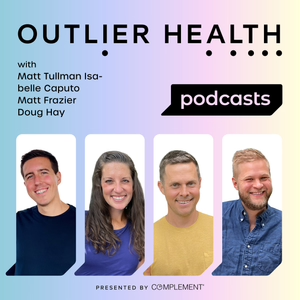
TT079: Hydration With Andy Blow (You’ll Definitely Learn Something New)
10/05/16 • 61 min
Previous Episode

TT078: Cody Beals – Canadian Ironman 70.3 Pro
Cody Beals is a third year Canadian pro specializing in the Ironman 70.3 distance. His results this year include two victories and no worse than a 7th place finish in seven Ironman 70.3 events. Later this month he will race the ITU Long Distance Triathlon World Championships in Oklahoma. His website, codybeals.com, details his training, finances, physical challenges (low testosterone), and more. Cody is very open about his life and that makes for a good interview.
Next Episode

TT080: Dangerous Hyponatremia After a 70.3 Half Ironman
Colin Pugh had a dangerous case of hyponatremia that could have resulted in death. Hydration expert Andy Blow joins us to review his case. In Colin's words, here is what happened: "On Aug 14th I did my first Half Ironman (Stealhead - Benton Harbor MI). I ran a pretty decent race and finished in a time of 5hrs 47 mins. After the race I was about a 3 hour drive from home in Milwaukee WI. I was over there on my own as my girlfriend was working that weekend. Based on the fact I couldn’t stand up without cramping I made the decision to hold up in a hotel for the night and make my way home on the Monday morning. I got to the hotel grabbed a shower and then started to become obsessed with the fact that I hadn't taken a pee all day and started taking on water (a lot of water!). This was quiet the mistake........ I then remember only a few things. I remember walking across to the gas station to buy more water and being completely out of it in my mind like kind of drunk feeling. Then I went to bed and woke up at 11pm and proceeded to throw up all a lot of that water back up which wasn’t pretty. I woke up the next day feeling really rough and text my girlfriend to say I’m not driving until I get kicked out of the hotel at Noon. Then the next thing I know is I’m at the breakfast table grabbing breakfast and all packed up and I had no idea how I got there. Then the last thing I remember on Monday morning was getting on to the highway at my intersection in Michigan and then the next recollection I had was waking up in the ICU on Wednesday morning in Chicago............. What happened? It turns out that I must have had the sub conscious thought to get to the Emergency Room. Because when I crashed my car into a truck I was only 6 blocks away from the University of Illinois Chicago Medical Center in downtown Chicago. But I had managed to drive over 70 miles without remembering a thing and then passed out behind the wheel. When the cops came up on my accident they said they found me having a seizure in the driver’s seat and then proceeded to smash me out of my car and get medical help. Then I got to the ER by ambulance and my girlfriend was calling my phone. The ER doctor answers the phone and tells her what they think is going on. My girlfriend is actually a doctor herself, she completely gets what the ER doc tells her and starts freaking out and gets in the car and starts driving the 1-2 hrs down to Chicago to be with me. So what was going on? Typical human blood has 140-145 mol/liter of Sodium in it. Anything less than 120 mol/liter is classed as serve. On my first blood work when I got to the ER it was at 113 mol/liter and that’s why I kept having seizures. I had Hyponatremia where you drink too much tap water and in essence dilute your blood. I was then admitted to the ICU early Monday and over Monday/Tuesday given fluids and monitored closely until I woke up on Wednesday morning very confused. While I was out I wasn’t being very cooperative it seems........I had to be tied down feet and hands to stop me from beating all the people up which wasn’t great for my girlfriend to see. After waking up I had no idea what year it was, what had happened, where I had raced, who the president was.......nothing.......and that was very worrying. But I quickly started to get it all back come Thursday and Friday. I was then discharged from the ICU to home on Friday. Quiet the experience that I need to get follow up appointments to completely figure out if I had a Kidney issue or if I just put myself in trouble by drinking so much water instead of something with electrolytes in it. In the meantime I’m back to work and doing fine, getting my car fixed up and taking it easy for a little while and deferring a few races that I was booked into for the rest of the season."
If you like this episode you’ll love
Episode Comments
Generate a badge
Get a badge for your website that links back to this episode
<a href="https://goodpods.com/podcasts/triathlete-training-podcast-triathlon-ironman-and-duathlon-23063/tt079-hydration-with-andy-blow-youll-definitely-learn-something-new-3320296"> <img src="https://storage.googleapis.com/goodpods-images-bucket/badges/generic-badge-1.svg" alt="listen to tt079: hydration with andy blow (you’ll definitely learn something new) on goodpods" style="width: 225px" /> </a>
Copy




